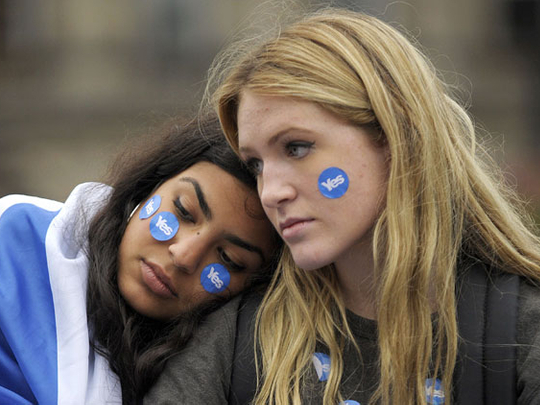
East Kilbride: The regular lunchtime crowd was shuffling into Peter’s Deli in the village here. Roast beef sandwiches on foccachia with beetroot and coleslaw, white ‘bap’ rolls with smoky cheddar cheese, strong tea, black coffee – all served with a spoonful of misery.
A good morning?
“Not really. We’re all gutted,” the young blonde girl says from behind the counter. All of us who work here – apart from ‘her’ – are disappointed.”
Like the mustard and mayo, the disdain is also free, it appears.
‘Her’ is a middle-aged woman with a hard, wrinkled face who’s working the cash register as the team of young counter assistants serve away. But her hard exterior smiles with a broken tooth.
“It’s done and I couldn’t be happier,” she hacks in a smoky voice seasoned from too much tobacco.
At Cornes DIY, around the corner, a tattooed counter help was sorting out a plumbing issue for an elderly man. The plastic fittings weren’t going together as they should, and they were putting the pieces on the counter to get the elbow and angle joints to fit property.
A good morning?
“A very good morning,” the tattoo man says. “Couldn’t be happier.”
Did the elderly man with the waterworks issues watch?
“No, I went to bed when the first results came in. You could tell we were going to win.”
The yellow-painted London-style cab driver from Kevlin Kabs was nattering away animatedly to a driver of a large white van. Both were dissecting the results and wondering what went right and what went wrong.
A good morning for one, not for the other.
For months – and for some, years – this Friday morning was the day of reckoning. It was the day when Scots were supposed to carve out a better future for generations to come. Or were to reaffirm their place in the United Kingdom, Scots proud to be British after generations in the fold.
It was just another morning in the village, where politics and polls were as relevant as plumbing and potato salad.
The local polling place at St. Leonards was gone, the boxes tallied, the results added into that mix of opinions from the record numbers of Scots. ‘Yes’ and ‘no’ signs still hung on the street lights, stickers were still on cars, and few had gotten around to removing the little ‘yes’ and ‘no’ label pins from their coats.
On radio, the result was being dissected, debated, derided.
“Operation Fear won,” expounded Tommy Sheridan, a socialist advocate who hadn’t been to bed this Friday lunchtime. “‘No’ voters caved into the scaremongering from the banks that mortgages would go up, from companies that jobs would be lost, and from London that Scots would be punished for voting ‘yes’.”
A bit disingenuous, perhaps?
“Not at all,” he ranted. “If you look at the areas who voted ‘no’, they were middle-class areas who were scared into voting with the fear that their mortgages would go up.”
Not at all, Commissar Sheridan, most Scots would say you’re wrong.
In Glasgow, the sprawling council estates — festering with social deprivation, unemployment, high crime, street violence, drugs, high number of long-term welfare cases – should have been fertile ground for the Scotland utopia offered by ‘yes’ and independence. They weren’t.
Glasgow turnout, even though it was 75 per cent – was the lowest.
And the ‘yes’ winning margin there was but 25,000 – not enough to sweep aside the mounting ‘nos from across the rest of the country and lead a triumphant nationalist parade down Edinburgh’s Princess Street to the Scottish parliament at Holyrood.
The reality is that all over this great land, from Stranraer in the south to Stornoway in the north, Jedburgh in the east to Johnstone in the west, Scots weren’t convinced it was the time to take that step into the unknown.
“I’m a little bit disappointed,” a freckle-faced woman said she worked the cash at a petrol station. “My heart was telling me to vote ‘yes’ but I couldn’t bring myself to do it.”
She resets the pumps for a waiting driver who’d just pulled in. “Alex Salmond says that it’s once in a generation. Maybe when I have kids,” she says. “In about 15 years’ time.”












